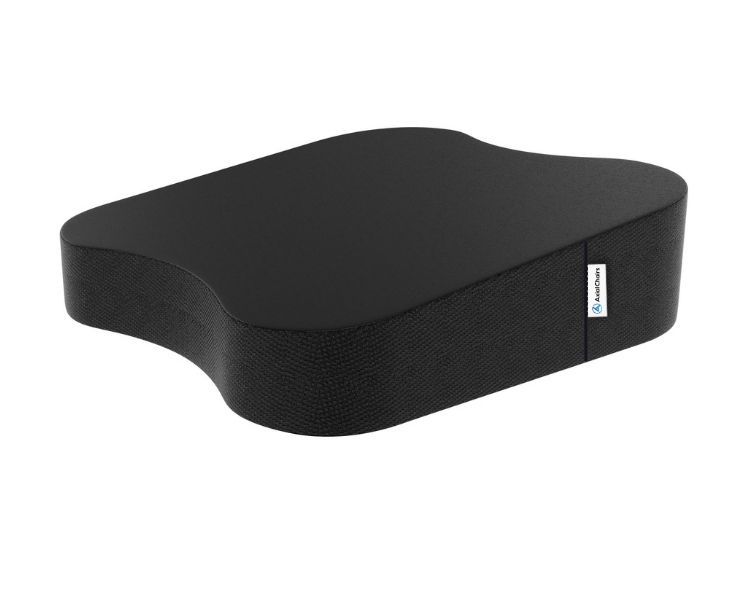Good morning! Are you experiencing some back pain when you wake up? If so, it’s likely not just a one-off occurrence–it may be something that comes and goes over time. As an orthopedic surgeon specializing in spine care, I often talk to my patients about the common issue of back pain after waking up. In this blog post, I’ll explain what causes this type of discomfort and why having it is important to pay attention to. I’ll also share some best practices for reducing the intensity or frequency of your back pain when waking up. So if you’re facing challenges with persistent early morning aches and pains, stick around – there are lots to learn here today!
As a general rule, back pain when awakening is often caused by stiffness or decreased blood flow from sleeping. Symptoms include soreness and stiffness in the lower back, which usually subside after moving around. To prevent it, use a supportive mattress and pillow, and maintain proper sleep posture.
Best Seat Cushion for Back PainAxial Ergonomic Seat Cushion® | Seat Chair Wedge
Quick Guide: A 30-Second Summary

All Day Comfort & Support
Product Name
Axial Designs™ Seat Cushion
Price
$149
Warranty
1 Year
Type
Posture Wedge
Top Layer
100% Natural Latex (Molded)
Bottom Layer
High-Density Foam
Top Material
Isometric Grippy Vegan Leather
Bottom Material
Non-Slip Material
Side Material
3D Breathable Fabric
How do I know if my back pain is serious?
Back pain can be a symptom of many different health conditions, including chronic pain. It is important to speak with your doctor if you are experiencing back pain that has lasted more than two weeks or if the pain is severe and disabling. According to Healthline Media, up to nine out of every 15 people will experience some form of back pain at some point in their lives. Morning back pain is also common and can be caused by poor sleeping habits or due to excessive strain on your body during the day. Low back pain is often due to low-grade inflammation which ramps up with age.
To reduce morning back pain, it’s important to try and align your spine with a pillow while you sleep. Changing your sleeping posture can also help alleviate back pain. If you find yourself waking up with lower back pain, it may be helpful to use a mattress that is supportive enough to support your spine in a neutral position and sleep on your side or back — not your stomach. Other helpful tips include using chiropractic care, physical therapy, and other treatments that target the source of the pain. Clinical information suggests that people who wake up with morning back pain may benefit from adjusting their sleep position, mattress type, and/or health conditions. People who experience chronic lower back pain may also wish to speak with their doctor as they may benefit from medication or additional treatments such as massage or chiropractic care.
Why does my back hurt when I go to bed at night?
Back pain when going to bed at night can be caused by a variety of factors, including poor posture during the day, sleeping on an old or uncomfortable mattress, or even stress. If you find yourself waking up with back pain in the morning, it may be helpful to adjust your sleep position and/or use a supportive pillow to align your spine properly. Additionally, people who experience chronic lower back pain may want to speak with their doctor as they may benefit from medication or additional treatments such as massage or chiropractic care. It is also important to ensure that you are getting enough sleep each night so that your body has time to heal and repair itself.
Why did I wake up with lower back pain on my right side?
Waking up with lower back pain on your right side can be caused by a variety of factors, such as poor posture during the day or sleeping in an awkward position. Additionally, if you have underlying health conditions, such as arthritis or other inflammation-related issues, this could also be the cause. To reduce morning back pain it’s important to try and align your spine with a pillow while you sleep and adjust your sleeping posture. You may also benefit from using a mattress that is supportive enough to support your spine in a neutral position and sleep on your side or back — not your stomach. If you experience chronic lower back pain, it may be beneficial to speak with your doctor about possible medication or treatments.
Why does my lower back hurt when I get up from sitting?
Lower back pain when getting up from sitting can be caused by a variety of factors, including poor posture during the day or prolonged periods of sitting. If you find yourself waking up with lower back pain in the morning, it may be helpful to adjust your sleep position and/or use a supportive pillow to align your spine properly. Additionally, people who experience chronic lower back pain may want to speak with their doctor as they may benefit from medication or additional treatments such as massage or chiropractic care. It is also important to ensure that you are getting enough exercise so that your muscles stay strong and flexible, which will help reduce the risk of developing back pain.
All Day Comfort & Support
Understanding Morning Pain: Causes and Symptoms
Morning back pain can range from minor to severe and can have a variety of causes, such as improper posture during the day or sleeping in an awkward position. Other causes of morning back pain include age-related changes, stress, underlying health conditions, and poor mattress support. Symptoms of morning back pain include soreness in the lower back area as well as muscle stiffness and pain when trying to move around.
To reduce morning back pain it is important to try and align your spine with a pillow while you sleep and adjust your sleeping posture. Additionally, people who experience chronic lower back pain may want to speak with their doctor as they may benefit from medication or additional treatments such as massage or chiropractic care. Taking regular breaks throughout the day to stretch, exercise, and move around can also help reduce the risk of developing chronic lower back pain.
How Sleep Quality Affects Your Spine Health
Sleep plays an important role in your overall spine health and can affect how quickly you recover from back pain. Poor sleep quality can lead to increased muscle tension, inflammation, and fatigue — all of which can contribute to lower back pain. Additionally, sleeping on a mattress that does not provide proper support for your spine can cause or worsen existing back pain. To ensure optimal spine health, it is important to get enough high-quality sleep each night on a supportive mattress that is comfortable for you. It may also be beneficial to practice good posture during the day and take regular breaks throughout the day to stretch and move around so that your muscles stay loose and flexible.
Common Orthopedic Solutions for Morning Back Pain
If you experience chronic lower back pain, there are several orthopedic solutions that can help reduce your symptoms and improve your quality of life. Common treatments for morning back pain include physical therapy, massage, chiropractic care, and medication. Depending on the severity of your condition, your doctor may also suggest lifestyle modifications such as wearing a brace or making changes to your daily routine. Additionally, if you experience severe or persistent lower back pain it is important to speak with your doctor as soon as possible to rule out any underlying health conditions or serious injuries.
Black Friday: 35% Off Today
Typical Delivery 1-3 Days
Tips for Relieving Morning Pain at Home
There are several ways to relieve morning back pain at home without the need for medications or treatments. Try stretching and exercising regularly throughout the day to keep your muscles loose, flexible, and strong. Additionally, it may be helpful to practice good posture during the day and invest in a supportive pillow if you suffer from chronic lower back pain. Lastly, make sure that your mattress is comfortable and supportive enough for your body so that you get high-quality sleep each night.
When to Seek Medical Attention for Morning Pain
In most cases, lower back pain can be relieved with at-home treatments and lifestyle modifications. However, if you experience persistent or severe back pain that does not improve after a few days of rest and self-care, it may be time to seek medical attention. Additionally, if you experience any other symptoms such as fever or numbness in your legs, speak with your doctor as soon as possible so they can rule out any underlying health conditions.
Preventing Morning Back Pain: Lifestyle Changes to Consider
The best way to prevent morning back pain is by making lifestyle changes that support your spine health. Practice good posture during the day, take regular breaks throughout the day to move and stretch and invest in a supportive mattress that provides enough cushion for your body. Additionally, it is important to maintain a healthy diet and stay hydrated in order to reduce inflammation and muscle tension.
Exploring Non-Orthopedic Treatment Options for Back Pain
In addition to orthopedic treatments, there are several non-orthopedic treatment options that can help relieve lower back pain. These may include acupuncture, yoga therapy, and massage therapy. Additionally, some studies have suggested that meditation and mindfulness can reduce inflammation and muscle tension which may lessen the severity of back pain. It is important to speak with your doctor before exploring any non-orthopedic treatment options as some therapies may not be suitable for everyone.
The Culprit of most back pain problems
As a chiropractor, I have observed that back pain can be classified into two categories: acute and chronic. Acute back pain usually subsides within a few days to a few weeks, whereas chronic back pain lasts for a minimum of one year.
Among the different types of back pain, lower back pain is the most prevalent. This type of pain can arise from various causes, including:
- congenital skeletal abnormalities such as scoliosis, lordosis, and kyphosis
- degenerative conditions like arthritis, spondylosis, and disc degeneration.
- Other potential causes of low back pain include spinal problems like sciatica, ruptured discs, spinal stenosis, spondylolisthesis, and osteoporosis.
- Additionally, conditions like piriformis syndrome, fibromyalgia, endometriosis, pregnancy, and tumors can also contribute to back pain.
Back pain can be caused by lifestyle factors such as prolonged sitting without proper back support, being overweight, or aging. Psychological factors like stress, anxiety, or depression, as well as a sedentary lifestyle and poor posture, can also contribute to back pain.
To prevent back pain and maintain a healthy back, it’s essential to maintain good posture while sitting during the day and adopt a proper sleeping position at night. Additionally, regular exercise and movement can help reduce the risk of back pain. Getting enough quality sleep is also crucial for a healthy back. As a healthcare provider, I recommend my patients follow these lifestyle practices to maintain good back health.
When to Seek Immediate Care for Back Pain
Indicators of Severe Back Pain Even though several instances of back pain can be remedied with self-care, some require the expertise of medical professionals. There are particular warning signals that necessitate prompt medical intervention: If your back pain is accompanied by a fever. If your groin region feels numb. If you abruptly encounter weakness in your legs. If you’re encountering a lack of control over your bladder or bowel movements. If you can’t sit or stand in a comfortable position. If your pain is progressively worsening instead of subsiding.
Summary
In conclusion, back pain when waking up can be a common problem. Knowing the causes, such as decreased blood flow or stiffness due to an uncomfortable sleeping position, can help you identify the root of your specific issue. Taking steps to prevent it in the future, like using a supportive mattress and pillow as well as maintaining proper sleep posture, can go a long way towards improving your back health. Remember that nobody is immune from experiencing this type of discomfort, so listen to your body and take any necessary action if you’re feeling too much strain. Listen to your specialist whether it’s a chiropractor, physical therapist or doctor for the best advice tailored for you. By following these tips and being attentive to how you feel upon rising, you’ll be well on your way towards having more comfortable mornings ahead.





